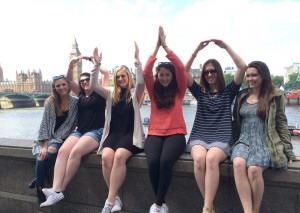This past May I had the opportunity to study abroad in London. I participated in the Global May Britain study abroad program and it was one of the best decisions of my life. I learned about the politics, culture and history of London both in and out of the classroom, which truly enriched my college experience.
Growing up in Columbus and attending a university so close to home made the transition from high school to college seamless. I wasn’t challenged by a new and unfamiliar city, or homesickness as most freshmen are. I hoped to venture outside the walls of my tight-knit community and experience independence and growth in a foreign city. I had always been a fan of big cities such as New York City and Los Angeles, which drew me to London. I couldn’t have chosen a better location for me to thrive and grow.
Going into this program I knew no one and was nervous to be away from my friends and family for a month. However the opportunity to be abroad far outweighed any of my hesitations. While abroad I expanded my horizons by making new friendships with both OSU students and London locals. I was also exposed to different parts of the city and saw the wide variety of the demographics in London. This opened my eyes to the fact that not all Londoners fit the tea sipping, pale skinned, proper stereotype. In the suburb we stayed in the neighborhood was primarily Indian and broke the initial vision I had of London. I realized that London is arguably a bigger mixing pot than New York City with all the surrounding European cities that flow into it. The different communities that make up London showed me the depth and history of the city. I now see London as a diverse city that brings together varying cultures. I now feel I am a more globally aware person and do not identify countries by my preconceived notions.
Everyday I found myself exposed to different cultures and faced with new experiences. One of the challenges I faced that helped me venture outside of my comfort zone was the transportation system. In London the tube system is heavily used and it took a lot of getting used to. Without the comforts of my car I was forced to stand extremely close with complete strangers, however this helped me to open up and make new friends. A lot of bonding occurred while on the tube whether that was singing late at night, getting completely lost or meeting unique locals. Although the tube started out as an unfamiliar and awkward form of transportation it grew to be one of the things I looked forward to everyday.
Another aspect of London that transformed my view of the world was the history. London is hundreds of years older than the United States and holds so many ancient gems. Seeing the Globe Theatre, the Tower of London, Shakespeare’s house in Stratford-Upon-Avon, The London Bridge, Big Ben and Westminster Abbey opened my eyes to the depth that London had to offer. I was fascinated by the incredible people who had once been in these places and made such an impact on London. I was so thankful for the opportunity to learn about the history of London in the classroom and truly understand the history of the sites when I saw them for myself.
Seeing the variances between the United States and London intrigued me and forced me to think in a more globally minded way. Continuously throughout the month I noticed differences and similarities between the people, food and culture. Whether it was the fact that the toilet paper was square napkins instead of a roll or the wonderful British accents that we lacked. I constantly found myself discovering new ways that the countries differed. The architecture particularly caught my attention and astonished me. Wherever I went I was always met with historical buildings, interesting museums and beautiful designs. Obviously, Columbus is a small town and would not have the big city feel, but even in New York City there is not the same level of ancient culture that London encompasses. Walking into St. Paul’s Cathedral and West Minster Abbey I got the feeling of royalty and breathtaking beauty that I fail to see in the United States. These architectural works of art are incredible to me and the fact that they were built so long ago without today’s technology is mind blowing. I now have a stronger appreciation for the past and the incredible buildings erected so long ago.
As corny as it sounds I can’t believe how much I have grown and evolved as a person in such a short amount of time while abroad. There is so much to be learned through experiencing different cultures and opening yourself up to new opportunities. I am so thankful for this trip and all the amazing new friends I have met through it. Not only have I grown personally, but academically and professionally as well. The fact that I took a history course abroad and can actually say that I saw what I learned about will be one of my most memorable experiences from college. In addition to this, getting to work in a small class allowed me to truly get to know my peers and teachers. Since studying abroad I have been inspired to take a semester abroad in Spain and plan to work in London post-grad. There is so much to be gained while studying abroad and I can’t wait to see what else is in store.
Check out my blog posts at: Keeping Up With Kaki








